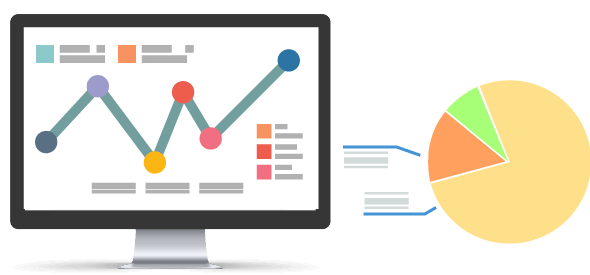Author: Whova | Last updated: June 09, 2025

Whether it’s a cozy meetup, a lively gala, or a game-changing conference, every unforgettable event starts with thoughtful planning. Good event project management turns a whirlwind of ideas into a smooth, memorable experience.
Without a solid plan, you’re stuck putting out fires and hoping for the best. But with the right approach, you’re in control, delivering something that feels effortless, stays on budget, and leaves everyone talking long after it’s over.
So, how do you make it happen? In this guide, we’ll review the key elements of event project management and share practical event planning tips.
Specifically, we’ll go over:
- What is event project management?
- Why does event project management matter?
- Stages of event project management
- Real-life examples of successful event project management
- Key takeaways for executing event project management
Keep reading to learn how to make your next event a success, no matter the size.
What is Event Project Management?
Event project management is the process of planning, organizing, and overseeing an event from start to finish. It involves defining specific goals that align with the event’s purpose and creating a detailed plan that outlines all tasks, timelines, and responsibilities.
It also entails resource management – coordinating vendors, controlling budgets, leading teams, and measuring results against original objectives to identify what worked well and where improvements can be made.
This is why event project managers exist. Their leadership and expertise allow them to handle the minor details and big tasks to keep things moving. They manage budgets, stick to deadlines, and catch problems early, so everything comes together without a hitch.
Such coordination creates a seamless experience for attendees while achieving the event’s strategic goals. Without dedicated oversight, events can be disorganized and fall short of expectations.
Why Does Event Project Management Matter?
When planning an event, there’s more on the line than you might realize. Your hard-earned reputation can erode when technical problems plague your attendees or sponsors watch deadlines slip by. Stakeholder trust fades fast with budget blowouts and broken promises.
Your team suffers too. Without clear direction, they’ll waste energy on duplicate work while crucial tasks get overlooked. Basically, unexpected problems become full-scale disasters when you haven’t planned for them.
Event project management prevents this and ensures success through:
- Improved Organization: Comprehensive planning ensures that everything runs smoothly, from venue logistics to vendor contracts, registration systems to attendee communication.
- Increased Efficiency: No more last-minute scrambles. With detailed timelines, adequate resource allocation, and standardized processes, your team can focus on execution.
- Risk Prevention: Is weather threatening your outdoor gala? Did a vendor cancel last minute? Flagging potential problems early lets you plan backups and keep your event on track.
- Stakeholder Confidence: Keep sponsors happy and executives engaged. Regular updates, transparent budgets, and consistent delivery transform skeptics into champions.
- Measurable Impact: Tracking attendance, engagement, and ROI shows how your event performed. These numbers highlight what worked and where you can do better next time.
Stages of Event Project Management
Events don’t just happen. They’re planned step by step. Here are the different stages of event project management with tips to make your next one successful:
Event Planning
These pre-event steps create a clear roadmap, ensuring a smooth start and aligning your goals with what’s possible for a memorable outcome.
1. Set Objectives and Goals
Why are you hosting the event? Maybe you want to generate leads, boost brand awareness, or unite your community. Whatever your reason, it should drive every choice, from choosing the venue to selecting speakers to planning activities.
Get specific with your goals. Need leads? Focus on networking sessions and ways to collect contact info. Want more brand visibility? Think media coverage and social media buzz.
When everyone knows what you’re trying to achieve, you can measure whether your event worked. Plus, your team stays focused on what matters instead of getting distracted by nice-to-have extras. Clear goals mean your event moves your business forward.
Download Free Event Budget Template
2. Set a Budget
How do you decide on an event budget?
First, list every expense you can think of – venue rental, food and beverages, marketing materials, speaker fees, staff costs, and don’t forget to set aside 10-15% for unexpected expenses. (It’s better to overestimate than get caught short.)
Next, prioritize items based on your event goals. If education is your focus, invest in quality speakers and AV equipment. If it’s about creating buzz, allocate more to marketing and social media coverage.
A proper budget will help you prioritize where to splurge (on elements that directly impact your attendees) and where to economize (on things they won’t notice). Track everything as you go. This prevents overspending and helps you make smart adjustments.
Pro tip: A successful event comes from structured spending. Invest thoughtfully in what your audience values most. Keep your budget in check for maximum impact.
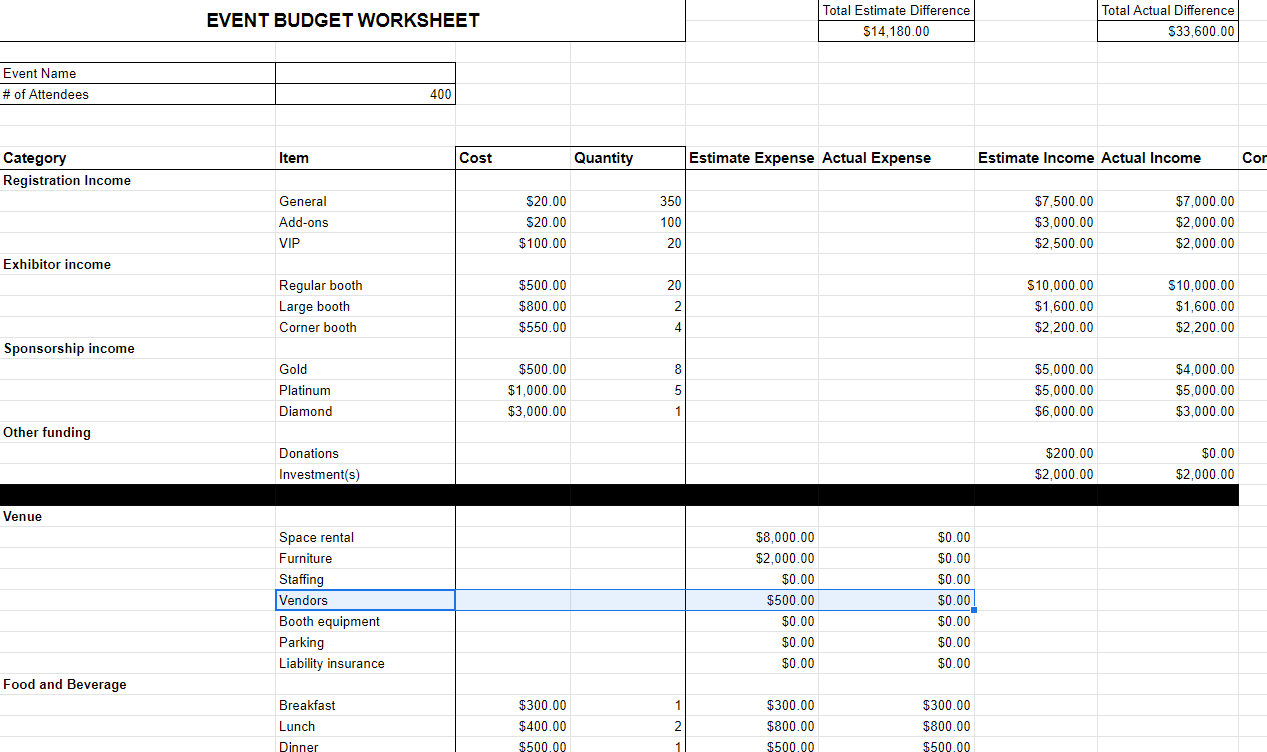
Whova’s free event budget template
3. Create a Timeline and a Checklist
Once you know your goals and budget, you need to schedule what needs to happen and when. Build backwards from your event date:
- 3-6 months before: Book your venue and major vendors
- 2-3 months before: Launch marketing campaigns, open registration
1 month before: Finalize catering numbers, confirm all vendors - 1 week before: Send final attendee communications, hold rehearsals
- Day before: Complete setup, run final checks
You can convert this event planning timeline into a master checklist. Break big tasks into smaller steps (like “book venue” becomes “research options,” “visit top 3,” “negotiate contracts,” “sign agreement”).
Give each task to a specific person with a clear deadline.
This way, everyone knows what they’re responsible for. Your timeline keeps you moving forward, and your in-person or virtual event checklist guarantees every detail gets handled.
4. Choose an Event Project Management Platform
The right tools make event planning and project management much easier. For simple events, free options like Google Sheets work great for tracking tasks and sharing updates with your team.
For bigger events, platforms like Whova can really transform how you work. Built specifically for event professionals, our platform centralizes registration, schedules, attendee communication, sponsorship management, real-time analytics, and more.
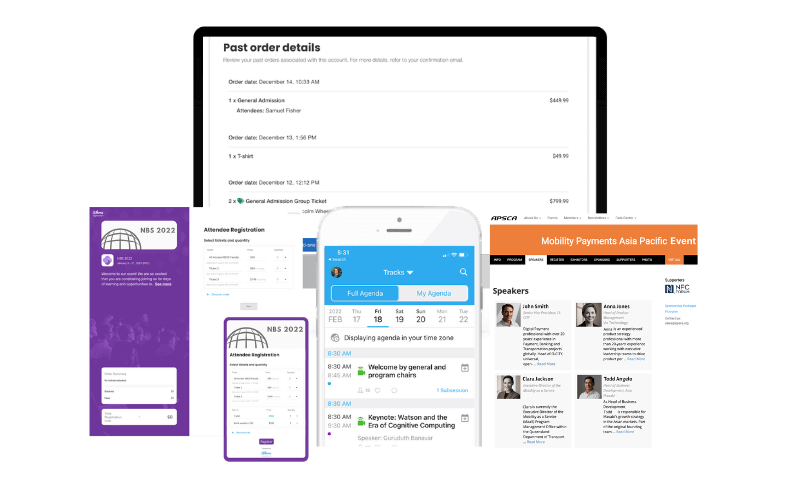
Whova’s all-in-one event management platform
Need to send a last-minute update to attendees? Done in two clicks. Want to check registration numbers? They’re right there on your dashboard. Sponsor asking for their booth traffic data? Pull the report instantly.
Instead of jumping between five different event planning tools or digging through spreadsheets, everything lives in one place. You’ll do less manual work and have more time to focus on creating exceptional experiences.
5. Identify Risks and Contingencies
Event planners know things can go wrong, like a venue mix-up, a last-minute speaker cancellation, or rain threatening your outdoor gala. Thoughtful planning means spotting these risks before they become disasters.
You can create a risk assessment that covers the most common threats:
- Vendor failures: Have backup contacts ready for catering, AV, and other critical services
- Technology breakdowns: Test all equipment beforehand and keep spare laptops, microphones, and chargers on hand
- Weather disruptions: Secure indoor alternatives or tent rentals for outdoor events
- Low attendance: Plan marketing pushes and early-bird incentives to boost registration
- Budget overruns: Set aside 10-15% contingency funds and track spending weekly
For each risk, develop a concrete backup plan. Who do you call if the caterer cancels? What’s your rain date? How will you handle a power outage? Document these solutions and share them with your team. When problems arise (and they will), you’ll respond quickly instead of scrambling for answers.
6. Logistics Management
All events need to manage logistics; the behind-the-scenes work that makes everything click.
In-person events are about juggling multiple moving parts. Choose a venue with enough space, a practical layout, ample parking, and accessibility features.
Transportation matters too—think guest shuttles or airport pickups for speakers.
Your team is key: experienced registration staff, quick tech support, and professional caterers who work like a well-oiled machine. Don’t forget equipment: clear sound systems, bright projectors, visible signage, and enough chairs for everyone.
Virtual events shift the focus to tech. Your streaming platform needs to handle hundreds or thousands of viewers without crashing. Savvy planners have backup internet and tech support on standby for glitches. Sharing documents should be seamless so presenters’ slides pop up without delays.
Pro tip: Smooth session transitions keep the energy up and respect everyone’s time.
7. Marketing and Promotion
Marketing drives attendance. Period. But which channels work for your event? Test different channels early. Run small social media campaigns, create a flashy event website, send targeted emails, post on event listing sites, and explore partnership opportunities.
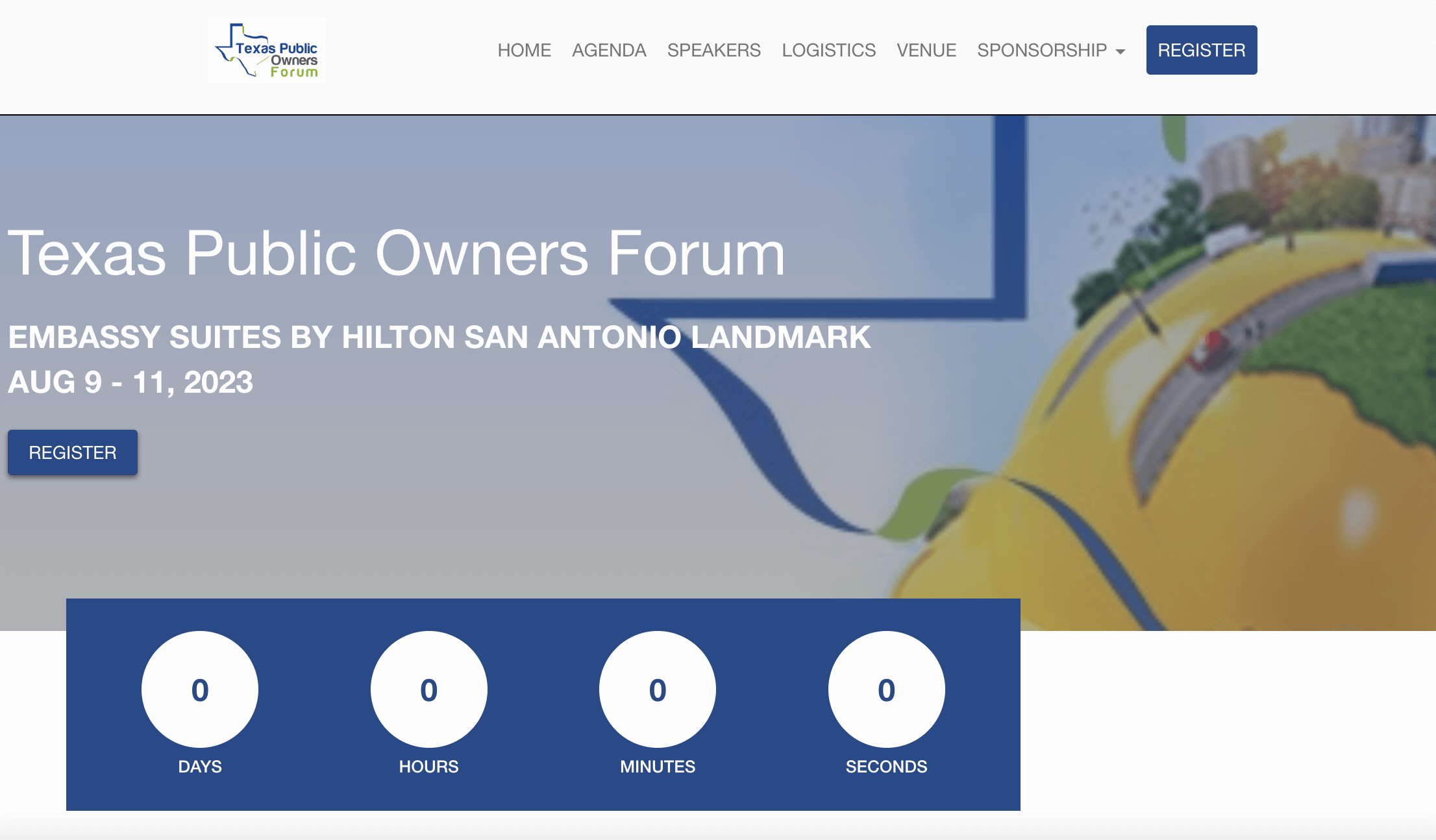
Whova’s customizable event website
Use analytics to track which platforms generate interest, not just likes, but actual registrations and ticket sales. You might learn LinkedIn outperforms Instagram for your B2B conference, or that partner newsletters drive more sign-ups than paid ads.
Next, build your promotional calendar around what makes your event special. It could be your keynote speaker’s reputation, exclusive networking sessions, or hands-on workshops.
And time your announcements strategically. Consider when your audience checks email, scrolls social media, or makes planning decisions. It’s important to keep messaging consistent and adapt the format for each platform. What works on Facebook won’t necessarily work in an email newsletter.
Marketing isn’t set-it-and-forget-it, so you have to review your metrics weekly. Double down on channels that deliver results and cut spending on those that don’t. Quick pivots based on real data can improve your attendance numbers. When you spot a winning formula, scale it up immediately. Better yet, draw up an event marketing plan.
Event Execution
The best plans mean nothing without solid execution. This is where your preparation meets reality. Strong leadership, clear communication, and quick problem-solving turn your detailed plans into a great experience.
1. Maintain Communication with Team Members
Your event lives or dies on real-time communication. When things move fast, information gaps create chaos.
So, set up clear communication channels before your event starts. Use WhatsApp groups, Slack channels, or walkie-talkies—whatever works for your team size and venue. Everyone should know exactly where to report issues and get updates.
Communicate during the event. Share status updates every hour, not just when problems arise. If catering runs 10 minutes behind, your registration desk needs to know. If more attendees arrive than expected, security should be informed immediately.
Quick check-ins prevent disasters. For example, “Keynote speaker arrived.” “AV setup complete.” “Parking lot filling up fast.” These simple messages keep everyone aligned and ready to adapt.
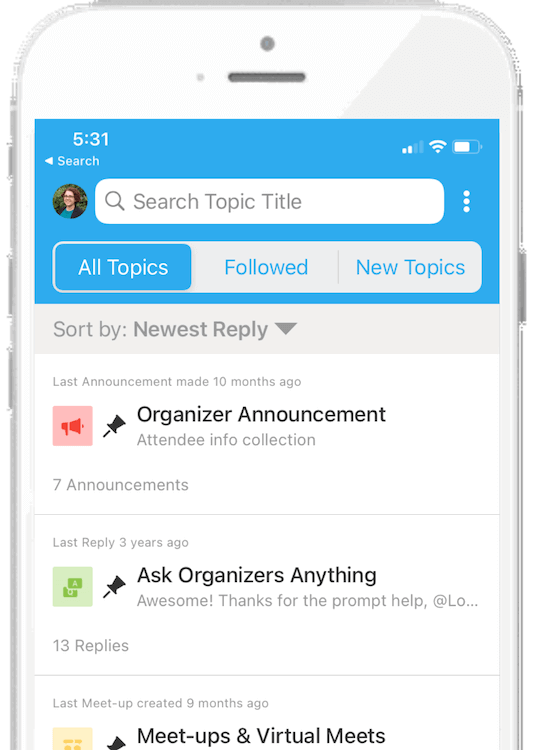
Whova’s community board houses organizer announcements, poll questions and other communication strategies all in one place!
Pro tip: Your attendees see one seamless experience. Behind the scenes, that takes constant coordination between every team member. Make sure you have an event communication strategy.
2. Assign Roles and Have Event Support
Every team member should know their specific responsibilities before doors open. Position your people strategically throughout the venue. Station greeters at entrances, floaters in session rooms, and troubleshooters near technical setups. Assign someone to shadow VIP speakers and another to monitor social media buzz.
Beyond assignments, excellence means anticipating needs before attendees ask. Your support team should spot confused faces, offer directions proactively, and solve problems quietly. When someone looks lost, don’t wait. Approach them first. This attention to detail separates good events from unforgettable ones.
Also, document everything. Create a shared log for attendee questions, complaints, and suggestions. These insights help you make the next event even better. That recurring question about parking? Next year’s signage solution. Multiple requests for phone chargers? Future sponsorship opportunity.
Stay vigilant throughout your event. Check on exhibitors before they flag issues. Visit sponsors to ensure their needs are met. Walk through your venue regularly. That flickering light or wobbly table might seem minor until it disrupts a keynote.
Finally, consider tech backup. Platforms like Whova offer real-time customer support, adding an extra safety net when your team gets stretched thin. Seasoned organizers use every available resource to deliver flawless experiences.
Post-Event
Post-event activities determine whether you’ll repeat past mistakes or build increasingly better experiences.
1. Post-event Evaluation
Your event isn’t truly over until you’ve measured its success. Review your original goals and objectives. Did you hit your attendance targets? Achieve sponsor satisfaction scores? Generate the leads you promised? Be honest about what worked and what didn’t. Numbers don’t lie, and neither should your assessment.
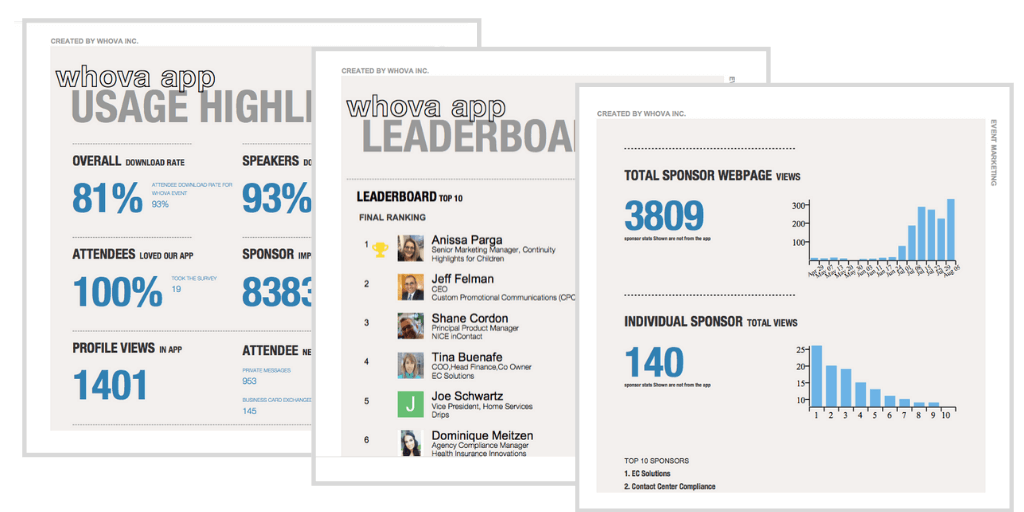
Whova’s post event report
Here, data works to your advantage. Analyze registration versus actual attendance, session popularity, networking engagement rates, and most importantly, your return on investment. Track which sessions had standing room only and which struggled to fill seats. Measure sponsor booth traffic and attendee dwell time. Calculate the real cost per attendee and revenue per participant.
Identify improvement opportunities systematically. Maybe your afternoon sessions consistently underperformed. Perhaps checkout lines backed up during peak times. That popular workshop that maxed out? Time to expand it next year. Every pain point can become a planning priority.
Compile everything into a comprehensive report for stakeholders. Include hard data, attendee feedback, team observations, and specific recommendations. Did you know tools like Whova automatically capture engagement metrics and generate polished reports? They can save hours of manual compilation and ensure nothing gets missed.
Pro tip: Great events evolve. Your post-event evaluation drives that evolution.
Real-Life Examples of Successful Event Project Management
See how leading organizations use Whova to master event project management:
L’Oréal Open Manufacturing America (OMA) CM Quality Day

L’Oréal demonstrated exceptional event project management when they hosted their Open Manufacturing America (OMA) and Contract Manufacturer Quality Day using Whova’s comprehensive platform. The event connected over 100 attendees, including prominent manufacturers from America, China, and Korea.
Whova’s virtual agenda kept all scheduling logistics in one centralized location, accessible to team members and attendees. This eliminated confusion about session times, locations, and speaker details. Our platform’s organized approach ensured everyone stayed informed throughout the packed agenda.
The digital check-in system streamlined attendee tracking, providing real-time attendance data that helped measure the event’s success. Organizers could instantly see participation rates for different sessions, allowing them to make quick adjustments when needed.
L’Oréal’s team managed complex logistics without missing a beat, and all critical data was automatically captured and organized. From tracking over 800 session views to managing photo sharing and networking activities, Whova’s tools enabled the team to focus on creating value for attendees rather than getting bogged down in administrative tasks.
Mastercard Foundation EdTech Conference

The Mastercard Foundation elevated its EdTech Conference by using Whova’s event management capabilities, delivering a seamlessly organized event for education sector stakeholders.
The organizers used Whova’s announcement feature to share real-time updates with attendees, informing everyone about schedule changes, important reminders, and key event details. The integrated Q&A functionality enabled direct dialogue between speakers and participants, fostering meaningful exchanges throughout the conference.
Session capacity management proved critical for maintaining quality experiences. By implementing session caps through Whova, organizers could control room capacity and prevent overcrowding. This ensured every attendee enjoyed comfortable seating and optimal viewing conditions during presentations.
A focus on clear communication and smart logistics created an environment where content and connections took center stage!
Conclusion
The key takeaways are straightforward: plan thoroughly, communicate constantly, and always evaluate your performance. When you approach events systematically, you minimize risks and maximize impact. Every event becomes an opportunity to learn and improve.
Modern event management software transforms these principles into reality. Platforms like Whova integrate essential checklists, real-time communication tools, and analytics into one accessible system. Your team stays aligned, attendees enjoy seamless experiences, and you automatically capture valuable data.
Ready to elevate your event management? Explore Whova’s all-in-one event platform to simplify event project management. Contact us for a demo!

